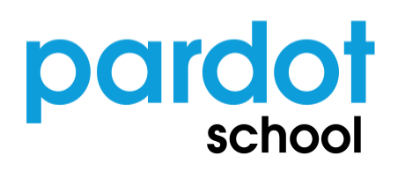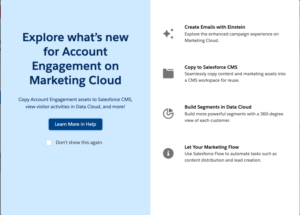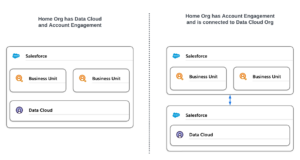Becoming a Pardot Consultant is a rewarding career move that many in the Salesforce ecosystem make. A Pardot Consultant deals with multiple Pardot accounts, one (or more*) for every client you are asked to manage by the consultancy/agency that employs you.
First things first – we need to establish what we mean by ‘Pardot Consultant’. We could be referring to either the job role or to the Salesforce certification. In this guide, I will be focusing on the Pardot Consultant job role. It’s worth mentioning that the Pardot Consultant certification is not exclusive to those with the exact job title ‘Pardot Consultant’; instead, the exam tests how you could adapt to different business use cases (I will come back to this later).
*there’s no longer a neat 1:1 ratio between clients and Pardot accounts. This is due to two forces: a) the Pardot Business Units release (which is, essentially, multiple Pardot accounts tied to one Salesforce org), and b) Pardot moving ‘upmarket’ to target enterprise organizations.
If you want to become a Pardot Consultant, I agree with your choice! It’s a path I’ve taken, myself, that awarded me exposure to all types of organizations (ie. taking a peek inside). This guide will cover the paths to becoming a Pardot Consultant, what qualities you need to excel, what consultancies looking for, and more.
What Does a Pardot Consultant Do?
Pardot Consultants are involved in technical Pardot work, mainly implementations, migrations, client support – or the campaign management side. Depending on your strengths, and the projects you land, you may find your focus is more on one side than the other.
You will be a trusted source of knowledge to advise clients in line with Pardot best practice and its growing number of capabilities to ultimately build a vision for their Pardot usage roadmap.

Most Pardot Consultants are involved across the entire project lifecycle – from presales and discovery, through to project completion. The Pardot Consultant is integral, handling the project operations in most cases (unless you work with a large project team, typical of enterprise clients, where there are more project roles and fewer ‘hats’ for you to wear). As Pardot is a niche specialization compared to other Salesforce skill-sets, it’s likely you’ll be asked to participate in the breadth of the project lifecycle.
- Pardot implementations: setting up new Pardot accounts, setting up the Salesforce Connector, enabling a feature in existing accounts, integrating another system.
- Migrations: moving data or marketing assets to Pardot from another platform (ie. the one they will no longer be using).
- Training: help clients get started using Pardot (this could include both technical and non-technical personas, so you will need to adjust your approach accordingly).
- Client support: resolving issues, answering questions.
- Pardot account audits: reviewing existing accounts to find inefficiencies/ways they can improve. Then work with clients to further maximize their usage of Pardot.
- Presales and discovery: being involved in the stages before the client buys Pardot/your services. You will meet with them to understand what they have (in terms of Salesforce products, other tools), what they need (their requirements), estimate how much time this will take, and produce a statement of work that outlines what you will deliver. Discovery is an in-depth requirements gathering, ironing out the small details and project timeline once the client has signed on the dotted line.
Find more listed in our Pardot Consultant Job Description.
Paths to Becoming a Pardot Consultant
There are multiple paths you can take to becoming a Pardot Consultant. While I detail the most common routes, I admit, there are many more (surely, a good sign, that the Pardot Consultant role is approachable from many angles without you needing to ‘climb’ a specific ‘career ladder’).

1. Experienced Pardot Specialist, that wants a new challenge.
You will have worked ‘in-house’ using Pardot, with a solid understanding of how your organization uses Pardot. You would most likely have admin permissions, have a say in account governance (keeping things neat inside Pardot), and could be the ‘go to’ person to answer other people’s questions. You have After a year or two of being hands-on with Pardot, you want a new challenge and to see into multiple Pardot accounts (as opposed to just your single account).
2. Consultant hired by a Salesforce consultancy
As Pardot grew in popularity over the past decade, the demand for specialized consultants grew, too. When consultancies would land a project that involved Pardot, they would look to their existing talent pool. This is how many Salesforce Consultants, working on Salesforce core (Sales/Service Cloud) would end up working with Pardot. With Pardot becoming ever more closely aligned, adding Pardot expertise to their portfolio is a no-brainer.
3. Technical marketer that works at a digital marketing agency
Digital marketing agencies will offer technical support for marketing automation platforms, as part of wider marketing campaign projects (that could involve content marketing, digital advertising, drip campaigns, etc.). While agencies will have their preferred platforms they work with, they tend not to work exclusively with one. In this way, it’s common for a client to begin an engagement where they bring the tool to the agency. Those working at agencies have to be adaptable, and get to grips with tools quickly, using their transferrable knowledge from configuring other tools.
As we’ve heard in a previous article, the marketing automation/Pardot career paths are not as well-defined as other roles that have been established for longer.
Which Qualities Make a First-rate Pardot Consultant?
Technical Experience
Clearly, this is paramount if you are going to be handling other organization’s technology. You need to be proficient in Pardot’s features, data relationships between objects, and how Pardot works with Salesforce, at a minimum. Furter into your role, you will likely be expected to adapt Pardot to different business use cases (eg. an organization working with Person Accounts), set up Campaign Influence, manage Pardot Business Units, and be able to customize B2B Marketing Analytics…
Analytics
B2B Marketing Analytics, the Salesforce analytics tool for Pardot data, has been seeing a sharp increase in customers. Beyond the dashboards and datasets that come out of the box, you will need to create custom ones to display what the client needs. Even if they don’t know what they need to see, you should guide them in ways they should be measuring their success.

Solution-minded
When drawing out solutions in Pardot/Salesforce, it’s not just about feature ‘A’ and ‘B’. Pardot Consultants need to see the bigger picture, as in, if ‘A’ does this to ‘B’, how does this impact ‘C’, and so forth. Changes can have far-reaching impacts that can cause unintended (and expensive) mistakes. Thinking about the bigger picture also involves thinking about the future, what might Pardot bring out in the coming releases that are best to wait for, versus building something totally custom in the immediate term?
Project Management
The critical skill for whatever type of consultant you want to become. Good project management skills are highly prized to consultancies where revenue relies on projects being delivered within scope and within budget.
Curiosity
Any good consultant asks questions – and listens. This is especially important if you’re making the move from in-house, to becoming a consultant. You have to work out how best to ask those questions. Combine your curiosity with good communication skills and business acumen; you’ll need to challenge assumptions and ask the hard questions to find out what your customer really needs.
What are Salesforce Consultancies Looking for in a Pardot Consultant?
Aside from the typical responsibilities I already covered, consultancies and agencies will be looking for someone that is comfortable communicating with clients, is able to “think on their feet”, and projects confidence. Being optimistic and thick-skinned (takes criticism well) will enable you to succeed in the role.
Check out our Pardot Consultant Job Description, verified by experienced Pardot Consultants who have overseen many new hires for the role.
Do you need to be Salesforce certified?
Certifications are sometimes listed on Pardot Consultant Job Descriptions as ‘essential’ or desirable, depending on the seniority of the position (in other words, more senior consultants will be expected to ‘hit the ground running’, whereas junior consultants could receive mentorship).
Salesforce Consultancies fall into partnership tiers that are determined by a number of factors – how many certifications their team has is one. Therefore, it’s in a consultancy’s interest to hire certified people or support you to get certified once you join. I’ll summarize by saying that having certifications can make you a more desirable candidate when up against competition for the role.
How to Pass the Pardot Consultant Certification
As I mentioned in the opening, the Pardot Consultant certification is not exclusive to those with the job title ‘Pardot Consultant’. Many roles can require the skills that Pardot Consultants need, just in-house (eg. requirements gathering from internal teams).
The certification exam tests how you could adapt to different business use cases (hence the rehashed “given a scenario” on the certification study guide).
One thing you do need to study for and pass this exam is experience. You can’t expect to take shortcuts and then be able to apply best practices to a range of business use cases in the real world!
I highly recommend you check out the Pardot Consultant Boot Camp series, run by a group of Marketing Champions. Find the full playlist here – below is a taste of the content:
What comes after?
If you have experience delivering Pardot projects (for enterprise-level clients) and don’t want to become a CMO/go into management, then there is a career move for you: Pardot Solution Architect.

While a relatively new role that’s appearing in the partner ecosystem, we expect the demand for this role to grow over the next 1-2 years as Pardot/Salesforce orgs become more complex, and integrations using the Pardot API become more in demand. Watch the full interview with Pardot Solution Architect, Ben Lamothe to get the full run-down!
Is this the best option for you?
Styles of working fall into two broad categories: ‘Agency’ and ‘In-house’ – in short client-facing, project-based work, vs. working on one internal account, as an employee.
The life of a Pardot Consultant isn’t for everyone – the constant demands can be draining (often overtaking strategic thinking/non-billable work), and overtime is common to deliver projects on time in line with client expectations.
There are pros and cons to each style of working. Check out Agency vs. In-House: Which Salesforce Marketing Role Fits Best? to help you decide.
This Pardot article written by:
Salesforce Ben | The Drip
Lucy Mazalon is the Head Editor & Operations Director at Salesforceben.com, Founder of THE DRIP and Salesforce Marketing Champion 2020.
Original Pardot Article: https://www.salesforceben.com/the-drip/how-to-become-a-pardot-consultant/
Find more great Pardot articles at www.salesforceben.com/the-drip/
Pardot Experts Blog
We have categorized all the different Pardot articles by topics.
Pardot Topic Categories
- Account Based Marketing (ABM) (7)
- Business Units (14)
- ChatGPT / AI (3)
- Completion Actions (5)
- Connectors (10)
- Custom Redirects (4)
- Data Cloud (3)
- Demand Generation (8)
- Dynamic Content (7)
- Einstein Features (11)
- Email Delivery (17)
- Email Open Rates (3)
- Pardot A/B Testing (2)
- Email Mailability (16)
- Do Not Email (1)
- Double Opt-in (2)
- Opt Out / Unsubscribe (14)
- Email Preferences Page (6)
- Engagement Studio (16)
- Industries (1)
- Non Profit (1)
- Landing Pages (9)
- Lead Generation (1)
- Lead Management (13)
- Lead Routing (3)
- Lead Scoring (16)
- Leads (3)
- Marketing Analytics – B2BMA (9)
- Marketing Automation (1)
- Marketing Cloud (3)
- Marketing Cloud Account Engagement (4)
- Marketing Cloud Growth (2)
- New Pardot Features (6)
- Opportunities (2)
- Optimization (2)
- Pardot Admin (65)
- Duplicates (1)
- Marketing Ops (1)
- Pardot Alerts (1)
- Pardot API (2)
- Pardot Automations (3)
- Pardot Careers (12)
- Pardot Certifications (4)
- Pardot Consulting (1)
- Pardot Cookies (4)
- Pardot Custom Objects (3)
- Pardot Email Builder (8)
- Pardot Email Templates (10)
- HML (6)
- Pardot Events (17)
- Pardot External Actions (1)
- Pardot External Activities (4)
- Pardot Forms (29)
- Form Handlers (8)
- Pardot Integrations (21)
- Data Cloud (2)
- Slack (1)
- Pardot Lead Grading (5)
- Pardot Lead Source (2)
- Pardot Lightning (1)
- Pardot Migration (1)
- Pardot Nurture / Drip Campaigns (2)
- Pardot Personalization (3)
- Pardot Profiles (1)
- Pardot Releases (18)
- Pardot Sandboxes (2)
- Pardot Segmentation (5)
- Pardot Strategy (7)
- Pardot Sync (2)
- Pardot Sync Errors (1)
- Pardot Tracker Domains (5)
- Pardot Training (3)
- Pardot Vs Other MAPs (4)
- Pardot Website Tracking (2)
- Reporting (22)
- Salesforce and Pardot (31)
- Marketing Data Sharing (2)
- Pardot Users (3)
- Salesforce Automation (5)
- Salesforce Flows (2)
- Salesforce Campaigns (22)
- Salesforce CRM (3)
- Record Types (1)
- Salesforce Engage (3)
- Salesforce Queues (2)
- Security and Privacy (1)
- Tags (3)
- The Authors (540)
- Cheshire Impact (9)
- Greenkey Digital (55)
- Invado Solutions (37)
- Jenna Molby (9)
- Marcloud Consulting (6)
- Nebula Consulting (67)
- Pardot Geeks (44)
- Salesforce Ben | The Drip (242)
- SalesLabX (16)
- Slalom (4)
- Unfettered Marketing (51)
- Uncategorized (1)
- Website Tracking (2)
- Website Search (1)
More Pardot Articles
See all posts
This Pardot article written by:
Salesforce Ben | The Drip
Lucy Mazalon is the Head Editor & Operations Director at Salesforceben.com, Founder of THE DRIP and Salesforce Marketing Champion 2020.
Original Pardot Article: https://www.salesforceben.com/the-drip/how-to-become-a-pardot-consultant/
Find more great Pardot articles at www.salesforceben.com/the-drip/








